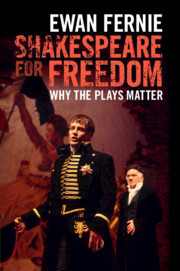Description
Shakespeare for Freedom
Why the Plays Matter
Author: Fernie Ewan
Shakespeare for Freedom shows why Shakespeare has mattered for four hundred years, and why he still matters today.
Language: EnglishApproximative price 30.28 €
In Print (Delivery period: 14 days).
Add to cart
Shakespeare for Freedom
Publication date: 04-2021
Support: Print on demand
Publication date: 04-2021
Support: Print on demand
Approximative price 50.95 €
In Print (Delivery period: 14 days).
Add to cart
Shakespeare for Freedom
Publication date: 03-2017
336 p. · 15.7x23.5 cm · Hardback
Publication date: 03-2017
336 p. · 15.7x23.5 cm · Hardback
Description
/li>Contents
/li>Biography
/li>
Shakespeare for Freedom presents a powerful, plausible and political argument for Shakespeare's meaning and value. It ranges across the breadth of the Shakespeare phenomenon, offering a new interpretation not just of the characters and plays, but also of the part they have played in theatre, criticism, civic culture and politics. Its story includes a glimpse of 'Freetown' in Romeo and Juliet, which comes to life in the 1769 Stratford Jubilee; the Shakespearean careers of the Leicester Chartist, Cooper, and the Hungarian hero, Kossuth; Hegel's recognition of Shakespearean freedom as the modern breakthrough; its fatal effects in America; the disgust it inspired in Tolstoy; its rehabilitation by Ted Hughes, and its obscure centrality in the 2012 Olympics. Ultimately, it issues a positive Shakespearean prognosis for freedom as a vital (in both senses), unending struggle. Shakespeare for Freedom shows why Shakespeare has mattered for four hundred years, and why he still matters today.
1. Reclaiming Shakespearean freedom; 2. Shakespeare means freedom; 3. 'Freetown!' (Romeo and Juliet); 4. Freetown-upon-Avon; 5. Freetown-am-Main; 6. Free artists of their own selves!; 7. Freetown philosopher; 8. Against Shakespearean freedom; 9. The freedom of complete being.
Ewan Fernie is Professor at the Shakespeare Institute (University of Birmingham) in Stratford-upon-Avon. He is joint editor of the Shakespeare Now! series and his books include Shame in Shakespeare (2001), Spiritual Shakespeares (2005), Reconceiving the Renaissance (with Ramona Wray, Mark Thornton Burnett and Clare McManus, 2005), Redcrosse: Remaking Religious Poetry for Today's World (2012), The Demonic: Literature and Experience (2012), Thomas Mann and Shakespeare (with Tobias Döring, 2015), and the novel he co-authored with Simon Palfrey, Macbeth, Macbeth (2016), which the philosopher Slavoj Žižek called 'a miracle, an instant classic'. In 2011, he co-wrote a civic liturgy for St George's Day which was performed in major cathedrals; and he is currently co-writing a play after Shakespeare's Pericles about immigration and sexual politics for the Royal Shakespeare Company. He is also working on the forgotten challenge of progressive culture in nineteenth-century Birmingham.
© 2024 LAVOISIER S.A.S.
These books may interest you

Shakespeare and World Cinema 81.47 €

Shakespeare and World Cinema 34.17 €



